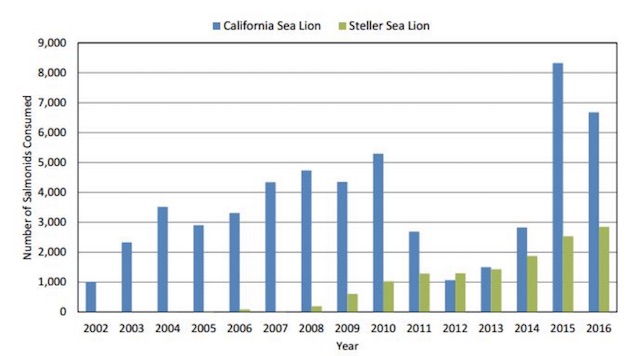forum
library
tutorial
contact

Bill to Expedite Sea Lion Removal
Clears House Natural Resources Committee
by Staff
Columbia Basin Bulletin, August 1, 2017
|
the film forum library tutorial contact |

|
Bill to Expedite Sea Lion Removal
by Staff
|
 WASHINGTON, D.C. -- The "Endangered Salmon and Fisheries Predation Prevention Act" advanced through the U.S. House Natural Resources Committee last week. The next step will be a vote on the U.S. House floor.
WASHINGTON, D.C. -- The "Endangered Salmon and Fisheries Predation Prevention Act" advanced through the U.S. House Natural Resources Committee last week. The next step will be a vote on the U.S. House floor.
The bill would allow both tribes and states to more quickly remove sea lions consuming salmon, steelhead and other fish species near Bonneville Dam.
While the removal program as proposed by the bill would still be subject to and limited by Section 120 of the Marine Mammal Protection Act, it would more closely be brought into alignment with the Endangered Species Act, according to the Columbia River Inter-Tribal Fish Commission.
Introduced by U.S. Reps. Jaime Herrera Beutler (R-WA) and Kurt Schrader (D-OR), the bill would allow Northwest states and tribes to potentially obtain sea lion removal permits via an expedited process.
"As long as sea lions continue to overpopulate the Columbia River and decimate our salmon and steelhead populations, I will work to protect our fisheries," said Herrera Beutler. "I am pleased to see our efforts to promote salmon recovery moving forward."
The legislation provides tribal managers and government fish managers with the means to remove limited numbers of sea lions from specific areas where they are posing the most harm.
A U.S. Corps of Engineer's June 7 report (Bi-Weekly Update: Pinniped Abundance and Salmon Predation at Bonneville Lock and Dam), the fourth and final report of the year, says about 1,837 adult salmonids were consumed by the sea lions May 13 to June 2, far higher than the 10-year average for the same period of 437 adult salmonids.
Over the entire reporting period (Jan. 1 to June 2), sea lions ate 4,993 adult salmonids. Some 82 percent of those were spring Chinook salmon. Six sturgeon were eaten, according to observers, and lamprey and other non-salmonids accounted for less than 5 percent of the predation.
"A review of the combined salmonid passage counts for the pinniped sampling season shows that the runs were delayed relative to previous years and smaller than the longterm average," the report says. "As such, the duration of pinniped presence and levels of fish predation were protracted relative to the 10 year average. The reduced salmonid runs and persistently high numbers of pinnipeds in the latter part of the season suggests that the total impact by pinnipeds on this year's salmonid run may be large."
The final predation numbers are being processed and will be available at a later date.
The 2017 legislation mirrors a proposal in January 2015, also introduced by Herrera Beutler and Schrader, as well as proposals introduced in the three previous years by now-retired Washington Rep. Doc Hastings.
Sea lion populations have seen a resurgence under the Marine Mammal Protection Act. In 1972 when the MMPA was passed, the California sea lion population hovered around 30,000 animals, CRITFC said. The population is now over 300,000.
Related Pages:
Predatory Sea Lions Are Detrimental to Columbia River Fish Runs by Gerry Lewis & Paul Ward, NW Fishletter, 5/1/17
learn more on topics covered in the film
see the video
read the script
learn the songs
discussion forum
